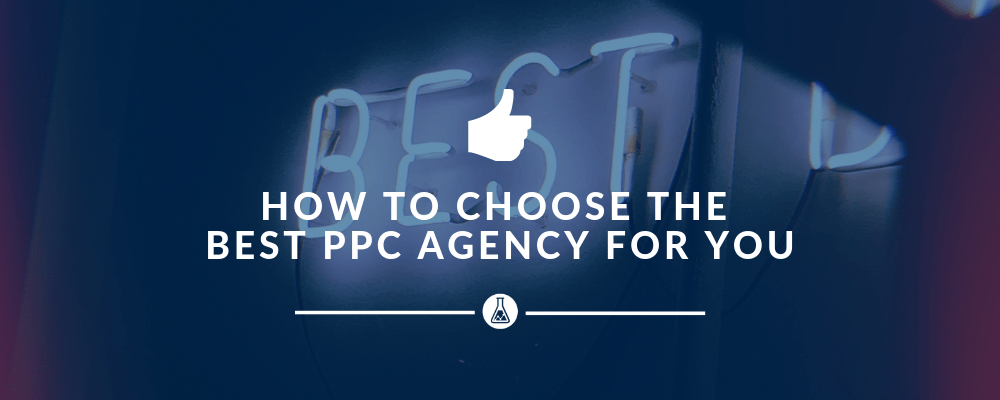Quick disclaimer: don’t worry… this isn’t one of those articles that promise to teach you how to choose a pay per click agency, but is in fact a thinly disguised sales pitch discussing how our agency is the #1 PPC agency in the entire world. That’s just not how we do things here at Search Scientists!
Instead, we’ll walk you through a step-by-step process that you can use to hone in on the best PPC agency for you.
If that happens to be Search Scientists, then awesome! We’d be happy to help you to maximize your ad spend, and crush your PPC campaigns.
If not, it’s all good. We won’t bug you or send you passive-aggressive texts like an ex that just won’t quit 😉
Alright, let’s jump right in!
Step #1: Think about what you want to achieve
When most businesses decide they want to outsource their campaigns to a paid traffic agency, their first step is to typically start Googling for agencies in their city.
But before you do that, take a second to think about what goals you want to achieve by hiring an agency.
Remember: the clearer you are about your objectives, the higher your chances of successfully partnering with a PPC agency!
Now, there are a number of reasons why you might be running PPC ads, including:
- To launch a new product
- To build brand awareness
- To move your leads further down your funnel
…but from what we’ve seen, most business owners are hoping to drive sales with their ads.
If that’s the case for you, you can simply determine your target revenue for the year, and work backwards from there.
For instance, say you want to hit $200,000 this year, and you’re hoping that $80,000 of that revenue will come from PPC.
This works out to around $6,6oo per month; if you’d like, you can use your Average Order Value (AOV) and conversion rate to break this down even further, and work out how many transactions or traffic you need to generate per month.
At the same time, you’ll also want to determine how much you can spend on your ads, without killing your margin.
It helps to take a look at your ROAS and ACOS here. If you’re not sure how to calculate or use these, check out our article on How to calculate your target ROAS and ACOS for PPC.
Now that you know the specific goals you want to hit, you can communicate these to the agencies that you speak to, and get their feedback on what you can do to hit those goals.
Step #2: Consider the various pricing structures
Cool beans – once you’re done setting your goals, the next step is to figure out what pricing structure works best for you.
You’ll have to choose from:
- Performance-based pricing
- A percentage of monthly ad spend
- A flat monthly rate, or
- A hybrid approach
Let’s discuss each of these options, one by one.
1. Performance-based pricing
First up, performance-based pricing sounds like you’re getting a good deal, but this might not necessarily be the case.
Here’s the thing: many companies will jump at the chance to pay their PPC agency based on the number of leads they generate…
But what they DON’T realize is that this typically leads to a PPC agency prioritizing quantity over quality.
Yes, you might find your number of leads skyrocketing… but if these are low-quality leads you’re getting, and your conversion rate drops as a result, you’re really just shooting yourself in the foot.
Don’t get us wrong – we’re not saying that you should rule out performance-based pricing completely. You can still experiment with this pricing structure – just make sure you define strictly what counts as a lead!
2. Percentage of monthly ad spend
Next, some agencies charge a percentage of your monthly ad spend.
On the bright side: this is a pretty transparent way of doing things, and it makes it easy to calculate how much working with a PPC agency might cost you.
That said, doing this will incentivize your PPC agency to focus on growing your monthly PPC budget, and your agency might be less concerned with driving down costs for you.
3. Flat monthly rate
Finally, there are PPC agencies which charge flat rates as well. If you’re working with one of these agencies, you don’t need to worry about misalignment of goals.
But if you’re not comfortable with paying a fixed retainer fee regardless of how much (or how little!) work gets done each month, this might not be a good fit for you.
4. Hybrid approach pricing
So, here’s the million dollar question: which agency pricing structure is the best?
If you ask us, the best option is a hybrid approach.
For instance, Search Scientists works using a base fee + percentage model which gives us the best of both worlds.
If you’re paying more for a certain month, you know that’s because we’re doing more work for you, and having that fixed fee ensures that we’re on the same page, and gunning for the same things.
Step #3: Identify key criteria
Moving on, your next step is to identify the basic criteria that you want your PPC agency to meet.
For instance, you might want your PPC agency to:
- Utilize a specific pricing structure
- Have expertise in a certain area (B2B, B2C, or specific industries)
- Specialize in certain types of PPC ads (Facebook vs Google Ads, Display vs Search vs Shopping campaigns)
- Be a Google Certified Partner or a Google Premier Partner
PSA: Search Scientists is a Google Premier Partner, an accolade only shared by the top 5% or so of all agencies. Just thought you should know!
Step #4: Come up with a list of options
Alrighty, the next step is to roll up your sleeves and start doing your research.
Now, most people just google “PPC agency {city}” — or “PPC agency {specialization}” if they want to hire remotely, which we’re definitely in favor of. Others prefer agency directories, because they offer tools for an easier comparison of the top pay per click companies.
If you want to hone in on agencies which are Google partners, use Google Marketing Platform Partners’ search tool instead.
On top of that, you can also reach out to your professional network and ask for referrals.
From here, compile a list of 10 or so agencies, then move onto the next step!
Step #5: Learn about each agency’s methodology
Time to make contact! Most PPC agencies will offer free consultations, or they might offer to put together a personalized proposal or quote.
At this point in time, make sure you learn about each agency’s methodology, and have them walk you through their process.
Now, don’t be afraid to hit up each agency with all the questions you’ve got, including…
- What are the bidding strategies that they use?
- How do they conduct keyword research?
- How do they optimize bids?
- How do they collect and analyze data?
Honing in on that last point, data is king when it comes to optimizing your campaigns. Bearing this in mind, you’ll want to make sure that your agency is doing all they can to track and analyze your data.
For example, we customize private reporting dashboards for all our clients. This makes tracking key metrics a breeze – all you have to do is log onto your dashboard, and you’ll be able to see an overview of all your important numbers.
Step #6: Think about working styles
Now that you’ve addressed the technical stuff, it’s time to think about how you and your PPC agency can best work together.
To minimize any miscommunication or conflict further down the road, you’ll want to set expectations upfront, and make sure everyone’s on the same page.
Here are some things to discuss:
- Will you have a dedicated account manager who serves as a main point of contact, or will you have to liaise with multiple people?
- How do you contact your PPC campaign manager? If you’re not able to reach them, how long will it take for them to get back to you?
- How long will it take for the agency to turn around requested changes?
- Will your PPC agency send you reports, and if so, how frequently will they do so?
It’s usually best to make sure that you have direct access to at least two points of contact; you can rely on these people to answer all your questions, and provide you with updates.
Also, the agency should answer your emails daily, so ask them if you’ll get a reply in about one business day.
Things change fast in the PPC world. Once per quarter, you and your agency should have a session for goal setting, PPC planning, and strategic vision mapping. In this session, you’ll discuss how to push everything forward, and maximize the results that you get from your PPC ads.
So chat with the agencies you’ve got on your list, and see if their working style is a good fit for you!
Step #7: Narrow down your options
You’re pretty much done with your information-gathering at this point; now, it’s time to evaluate and narrow down your options.
Here, you’ll probably take a closer look at each PPC agency’s case studies, and check out their testimonials and/or reviews.
Now, there’s nothing left to do but hone in on The One, and start working with them to increase the effectiveness of your PPC ads!
A final word on choosing the best PPC advertising agency
There are plenty of PPC agencies out there, but not all of them are made equal.
Now, many business owners simply do a cursory Google search, then go with the most cost-effective PPC agency they can find…
But trust us, this is not the right approach to take.
Instead, make sure you invest the time and effort in learning more about your various options, and weigh up which is likely to be the best fit for you.
Best of luck in finding The One! 😉
P.S. In the meantime, you can request a PPC proposal, feel free to apply for it at any time.




